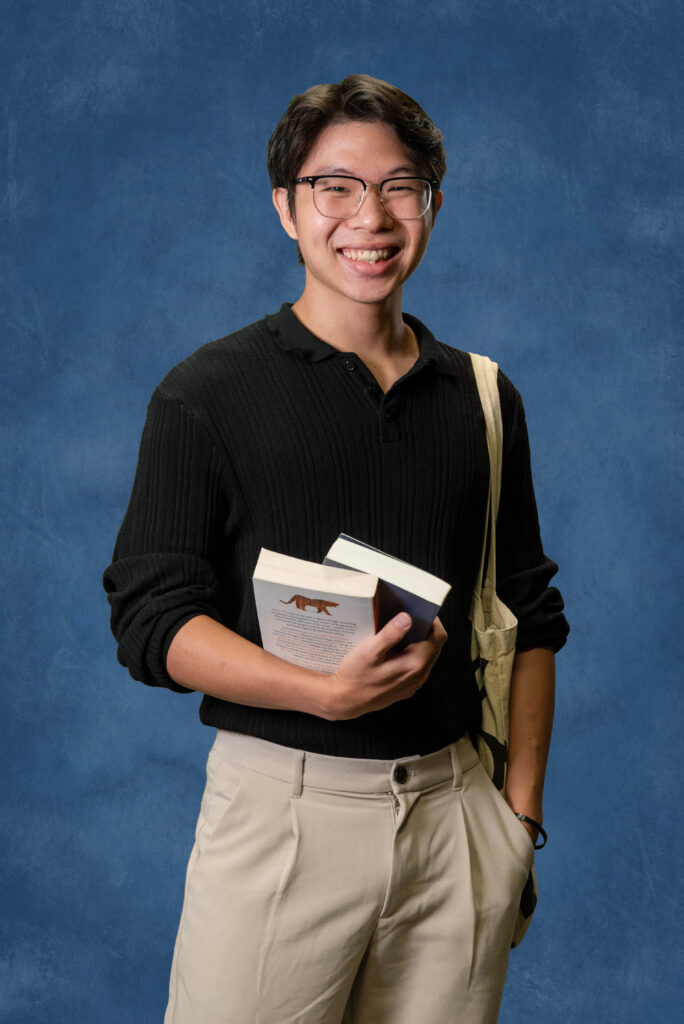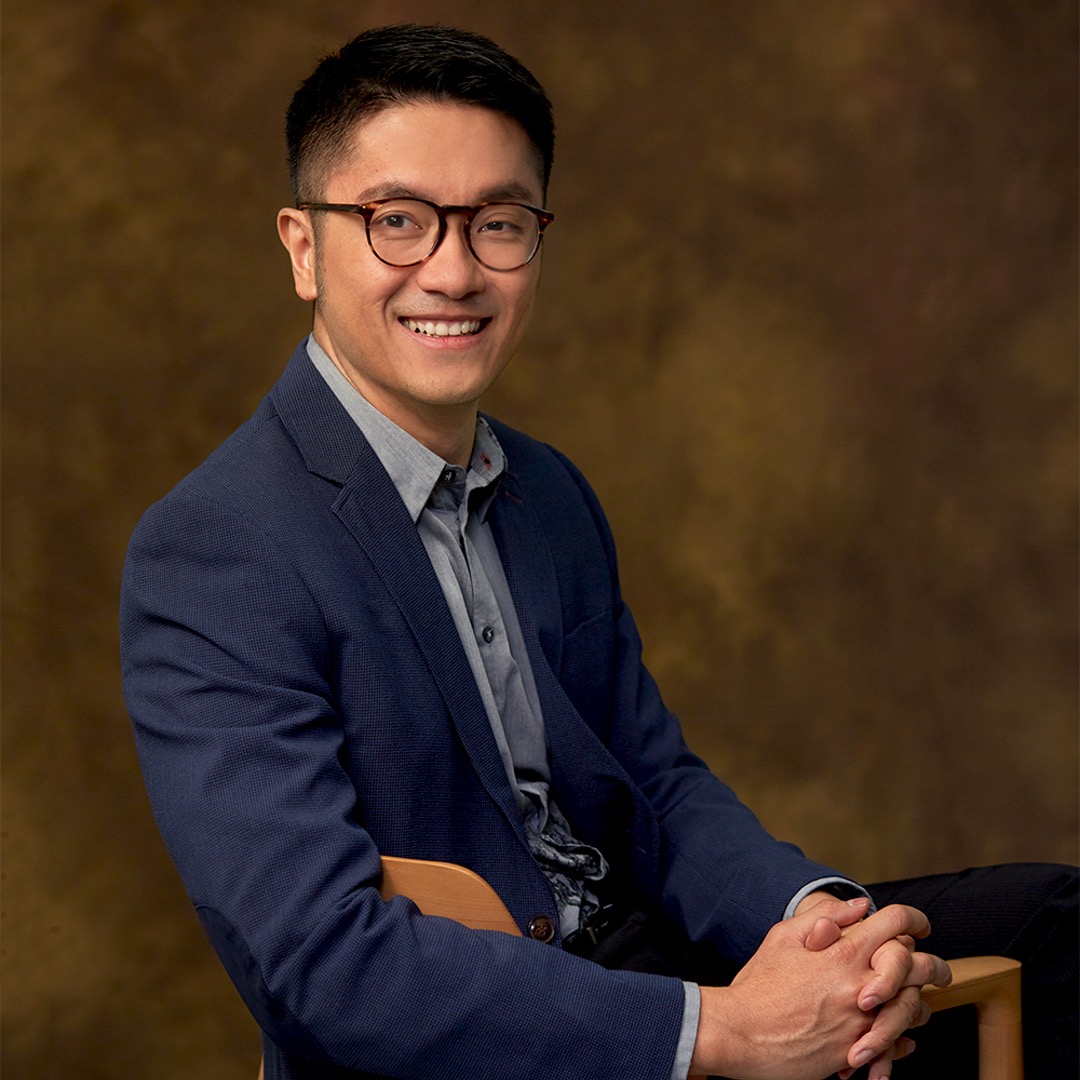Why English Language and Linguistics?
The systematic study of human language from different perspectives: English Language and Linguistics gives students the opportunity to investigate linguistic phenomena in multicultural and multilingual contexts.
The Department offers a wide array of courses for students to enhance their analytical skills: linguistic patterning, the contextual-based development of language in different cultures and institutions, and even how this field interacts with others such as semiotics, literature and popular culture. Our students are critical and creative thinkers who are able to express themselves in speech and writing with clarity, precision and elegance.

Why English Literature?
The study of English Literature is the study of life’s possibilities. Through the alluring, imaginative worlds of writers like Shakespeare, the Brontë sisters, Toni Morrison and J. M. Coetzee, learn to see the world with a broad, flexible, critical and creative mind.
We embrace the diversity of literature here at NUS. Our students have the opportunity to study the main periods of British and American literature as well as world literature such as South Asian and Southeast Asian literature. There is flexibility in adopting generic or topic approaches with subjects such as film, visual media, critical theory, gender and sexuality, and contemporary issues like literature and ecology. Students are trained to read literature using aesthetic, historical, political or theoretical approaches.

Why Theatre and Performance Studies?
The study of theatre and performance will engage your creative and critical mind. At NUS Theatre and Performance Studies, we believe that the study of theatre: its practices, its operations and its impact on society can equip you with transferrable critical thinking, resource organisation and public call-and-response skills.
Courses offered by the Department share a common commitment to understanding how theatre is made and the contexts in which it has significance for its communities. Students have the opportunity to study a wide range of cultures, histories, movements and ideas: everything from pre-modern Asian theatres to current cinematic and digital practices.

Curriculum (Cohort 2024 onwards)
Single Major in English Language and Linguistics (EL) [B.A. (Hons)]
Pass at least 60 units of EL or EL-recognised courses which include the following:
- EL1101E The Nature of Language
- A minimum of 12 units at level-2000 from the following:
(i) EL2101 Structure of Sentences and Meanings
(ii) EL2102 Sound Patterns in Language
(iii) EL2111 Historical Variation in English
(iv) EL2151 Social Variation in English - A minimum of 36 units at level-3000 or higher, with
(i) a minimum of 20 units at level-4000 or higher
(ii) a maximum of 4 units at EL level-5000 (subject to the Department’s approval) - A maximum of 8 units of EL-recognised courses
Note:
A maximum of 8 units from the following EL-recognised courses may be read to fulfil EL Major requirements:
CL2280 Basic Translation or TRA2101 Basic Translation
CL2281 Translation and Interpretation or INT2101 Basic Interpreting
CL2291 Chinese Anthropolinguistics (in English) or CH3210 Chinese Anthropolinguistics
CL3201 Communicating through Chinese Rhetoric and Metaphors
CL3207 Chinese Sociolinguistics or CL3317 Chinese Sociolinguistics
CL3213 Chinese Semantics
CL3214 Aspects of Chinese Linguistics
CL3217 The Analysis of Chinese Morphosyntax
EN3245 Feminism: Text and Theory
NM2301 Persuasive Communication: Theory and Application
NM3207 Philosophy in Communications and New Media
NM3222 Interactive Storytelling
PH2242 Philosophy of Language
PH3245 Language and Thought
PH4242 Issues in the Philosophy of Language
PS4220 Rhetoric and Politics
TRA2111 Introduction to Translation and Interpreting
Second Major in English Language and Linguistics (EL)
-
- EL1101E The Nature of Language
- A minimum of 12 units at level-2000 from the following:
EL2101 Structure of Sentences and Meanings
EL2102 Sound Patterns in Language
EL2111 Historical Variation in English
EL2151 Social Variation in English - A minimum of 12 units at level-3000 or higher
- A maximum of 8 units of EL-recognised courses
Note:
A maximum of 8 units from the following EL-recognised courses may be read to fulfil EL Major requirements:CL2280 Basic Translation or TRA2101 Basic Translation
CL2281 Translation and Interpretation or INT2101 Basic Interpreting
CL2291 Chinese Anthropolinguistics (in English) or CH3210 Chinese Anthropolinguistics
CL3201 Communicating through Chinese Rhetoric and Metaphors
CL3207 Chinese Sociolinguistics or CL3317 Chinese Sociolinguistics
CL3213 Chinese Semantics
CL3214 Aspects of Chinese Linguistics
CL3217 The Analysis of Chinese Morphosyntax
EN3245 Feminism: Text and Theory
NM2301 Persuasive Communication: Theory and Application
NM3207 Philosophy in Communications and New Media
NM3222 Interactive Storytelling
PH2242 Philosophy of Language
PH3245 Language and Thought
PH4242 Issues in the Philosophy of Language
PS4220 Rhetoric and Politics
TRA2111 Introduction to Translation and Interpreting
Minor in English Language and Linguistics (EL)
Pass at least 20 units of EL courses which include:
- EL1101E The Nature of Language
- A minimum of 4 units of EL courses at level-2000 from the following:
(i) EL2101 Structure of Sentences and Meanings
(ii) EL2102 Sound Patterns in Language
(iii) EL2111 Historical Variation in English
(iv) EL2151 Social Variation in English - A minimum of 4 units of EL courses at level-3000
Note:
- Only EL-coded courses can be used to fulfill the EL Minor requirements.
- Up to 8 units may be used to meet (i) the Minor requirement and (ii) another requirement, e.g., College, Faculty, Major, Second Major, Minor, Specialisation or other requirement.
- Please refer to the guidelines/requirements pertaining to the Minor programmes at the FASS Student Portal and the Registrar's Office (Minor programmes) website.
Single Major in English Literature (EN) [B.A. (Hons)]
Pass at least 60 units of EN or EN-recognised courses which include the following:
- EN1101E An Introduction to Literary Studies
- A minimum of 4 units at EN level-2000
- A minimum of 8 units from literature before 1800
- A minimum of 36 units at level-3000 or higher, with
(i) a minimum of 20 units at level-4000 or higher
(ii) a maximum of 4 units at EN level-5000 (subject to the Department’s approval) - A maximum of 8 units of EN-recognised courses
Note:
- List of literature before 1800 courses:
EN2201 Backgrounds to Western Literature and Culture
EN2205 Late Medieval Literature and Culture
EN2209 Literature and Culture in Ancient Rome
EN2214 The Marvelous World of Journey to the West (in English)
EN3218 Secrets of the Renaissance Library
EN3220 From the "Age of Epic" to the "Age of TV"
EN3221 The English Renaissance
EN3222 The Eighteenth Century
EN3226 Shakespeare
EN3227 Romanticism
EN3228 Women Novelists: 1750 - 1800
EN3229 Shakespeare in His Time and Ours
EN4221 Topics in the Seventeenth Century
EN4222 Topics in the Eighteenth Century
EN4227 Five Years in the Eighteenth Century
EN4251 Jonathan Swift
EN4269 Ovid the Innovator: Advanced Ancient Roman Poetry
EN4880A Usurpation and Authority, 1558-1674 - A maximum of 8 units from the following EN-recognised courses may be read to fulfil EN Major requirements:
EL3222 Cinematic Discourse and Language
EL3258 The Sociolinguistics of Humour: Jokes and Comedies
EL4221 Narrative Structures
EL4253 Language, Gender and Text
PH2209 Philosophy of Art
PH2219 Critical Theory and Hermeneutics
PH2224 Philosophy and Film
PH3214 Philosophy and Literature
PS4220 Rhetoric and Politics
TS2239 Major Playwrights of the 20th Century
TS2241 Writing the Short Film
TS3246 Shakespeare and Asian Performances
TS4220 Shakespeare and Film
Second Major in English Literature (EN)
Pass at least 40 units of EN or EN-recognised courses which include the following:
- EN1101E An Introduction to Literary Studies
- A minimum of 4 units at EN level-2000
- A minimum of 8 units from literature before 1800
- A minimum of 12 units at level-3000 or higher
- A maximum of 8 units of EN-recognised courses
Notes:
- List of literature before 1800 courses:
EN2201 Backgrounds to Western Literature and Culture
EN2205 Late Medieval Literature and Culture
EN2209 Literature and Culture in Ancient Rome
EN2214 The Marvelous World of Journey to the West (in English)
EN3218 Secrets of the Renaissance Library
EN3220 From the "Age of Epic" to the "Age of TV"
EN3221 The English Renaissance
EN3222 The Eighteenth Century
EN3226 Shakespeare
EN3227 Romanticism
EN3228 Women Novelists: 1750 - 1800
EN3229 Shakespeare in His Time and Ours
EN4221 Topics in the Seventeenth Century
EN4222 Topics in the Eighteenth Century
EN4227 Five Years in the Eighteenth Century
EN4251 Jonathan Swift
EN4269 Ovid the Innovator: Advanced Ancient Roman Poetry
EN4880A Usurpation and Authority, 1558-1674 - A maximum of 8 units from the following EN-recognised courses may be read to fulfil EN Major requirements:
EL3222 Cinematic Discourse and Language
EL3258 The Sociolinguistics of Humour: Jokes and Comedies
EL4221 Narrative Structures
EL4253 Language, Gender and Text
PH2209 Philosophy of Art
PH2219 Critical Theory and Hermeneutics
PH2224 Philosophy and Film
PH3214 Philosophy and Literature
PS4220 Rhetoric and Politics
TS2239 Major Playwrights of the 20th Century
TS2241 Writing the Short Film
TS3246 Shakespeare and Asian Performances
TS4220 Shakespeare and Film
Minor in English Literature (EN)
Pass at least 20 units of EN courses which include:
- EN1101E An Introduction to Literary Studies
- A minimum of 4 units at EN level-2000
- A minimum of ONE literature before 1800 course
- A minimum of 4 units of EN courses at level-3000
Notes:
- Only EN-coded courses can be used to fulfil the EN Minor requirements.
- List of literature before 1800 courses:
EN2201 Backgrounds to Western Literature and Culture
EN2205 Late Medieval Literature and Culture
EN2209 Literature and Culture in Ancient Rome
EN2214 The Marvelous World of Journey to the West (in English)
EN3218 Secrets of the Renaissance Library
EN3220 From the "Age of Epic" to the "Age of TV"
EN3221 The English Renaissance
EN3222 The Eighteenth Century
EN3226 Shakespeare
EN3227 Romanticism
EN3228 Women Novelists: 1750 - 1800
EN3229 Shakespeare in His Time and Ours
EN4221 Topics in the Seventeenth Century
EN4222 Topics in the Eighteenth Century
EN4227 Five Years in the Eighteenth Century
EN4251 Jonathan Swift
EN4269 Ovid the Innovator: Advanced Ancient Roman Poetry
EN4880A Usurpation and Authority, 1558-1674 - Up to 8 units may be used to meet (i) the Minor requirement and (ii) another requirement, e.g., College, Faculty, Major, Second Major, Minor, Specialisation or other requirement.
- Please refer to the guidelines/requirements pertaining to the Minor programmes at the FASS Student Portal and the Registrar's Office (Minor programmes) website.
Single Major in Theatre and Performance Studies (TS) [B.A. (Hons)]
Pass at least 60 units of TS or TS-recognised courses which include the following:
- TS1101E Introduction to Theatre and Performance
- TS3103 Theatre Lab (8 units)
- A minimum of 4 units from each of the following strands:
(i) Framing Histories
(ii) Cultures in Practice
(iii) Researching Performance (including TS3103) - A minimum of 36 units at level-3000 or higher (including TS3103), with
(i) a minimum of 20 units of TS courses at level-4000 or higher
(ii) a maximum of 4 units at TS level-5000 (subject to the department’s approval) - A maximum of 8 units of TS-recognised courses
Note:
List of TS-recognised courses :
EL4222 Stylistics and Drama
EN2203 Introduction to Film Studies
EN3226 Shakespeare
EN3242 History of Film
EN3248 Reading the Horror Film
EN4242 Modern Critical Theory
EN4244 Topics in Cultural Studies
EN4271 Research Workshop
GESS1021 Singapore Film: Performance of Identity
CFA3160 Artistic Identities and Pathways
NHT2209 Theatre-Making
NHT2212 Beginning Acting for the Stage
SE2224 Unmasked! An Introduction to Traditional Dance in SEA
Students majoring in TS will be exempted from the pre-requisites for these TS-recognised courses. To read the TS-recognised level 4000 courses, students must fulfil the general pre-requisites of level 4000 courses.
For guidelines on GESS1021 as TS-recognised course, please refer to updates in the General Education website.
Second Major in Theatre and Performance Studies (TS)
Pass at least 40 units of TS or TS-recognised courses which include the following:
- TS1101E Introduction to Theatre and Performance
- TS3103 Theatre Lab (8 units)
- A minimum of 4 units from each of the following strands:
(i) Framing Histories
(ii) Cultures in Practice
(iii) Researching Performance (including TS3103) - A minimum of 12 units at level-3000 or higher (including TS3103)
- A maximum of 8 units of TS-recognised courses
Note:
List of TS-recognised courses:
EL4222 Stylistics and Drama
EN2203 Introduction to Film Studies
EN3226 Shakespeare
EN3242 History of Film
EN3248 Reading the Horror Film
EN4242 Modern Critical Theory
EN4244 Topics in Cultural Studies
EN4271 Research Workshop
GESS1021 Singapore Film: Performance of Identity
CFA3160 Artistic Identities and Pathways
NHT2209 Theatre-Making
NHT2212 Beginning Acting for the Stage
SE2224 Unmasked! An Introduction to Traditional Dance in SEA
Students majoring in TS will be exempted from the pre-requisites for these TS-recognised courses. To read the TS-recognised level 4000 courses, students must fulfil the general pre-requisites of level 4000 courses.
For guidelines on GESS1021 as TS-recognised course, please refer to updates in the General Education website.
Minor in Theatre and Performance Studies (TS)
Pass at least 20 units of TS courses (excluding TS3103 and TS3245), which include:
- TS1101E Introduction to Theatre and Performance
- A minimum of 4 units from each of the following strands:
- Framing Histories
- Cultures in Practice
- Researching Performance
- A minimum of 4 units at TS level-3000 or higher
- TS3103 Theatre Lab and TS3245 Professional Theatre Internship cannot be read by TS minor students as they can only be read by TS major students.
Note:
- Only TS-coded courses can be used to fulfil the TS Minor requirements.
- Up to 8 units may be used to meet (i) the Minor requirement and (ii) another requirement, e.g., College, Faculty, Major, Second Major, Minor, Specialisation or other requirement.
- Please refer to the guidelines/requirements pertaining to the Minor programmes at the FASS Student Portal and the Registrar's Office (Minor programmes) website.
Admissions
Students are admitted into the Faculty of Arts and Social Sciences (FASS), NUS. During their first few semesters in FASS, they will decide on their disciplinary major. The Department of English, Linguistics and Theatre Studies offers three majors: (1) English Language and Linguistics; (2) English Literature; and (3) Theatre Studies.
The common entry requirement for all three majors is that candidates should:
be exempted from the NUS Qualifying English Test, or
have passed the NUS Qualifying English Test, or
be exempted from further CELC remedial English courses
Job Ready
Graduates from the English Language and Linguistics programme have embarked on careers in myriad industries, such as communication, advertising, journalism and media; arts, culture, entertainment and heritage; public administration; speech pathology and therapy; public relations; events management; translation and interpretation; language technology; banking, finance and consultancy; entrepreneurship; human resources; business management; teaching and education management; graduate research and university teaching, etc. Also, the English Language and Linguistics major is identified under the following FASS 2.0 industry tracks: Public Administration; Communication, Advertising and Media; and, Arts, Culture, Entertainment and Heritage.
In addition to a sensitivity to language and the sophisticated communicative skills developed through intensive engagement with literary texts and criticism, the English Literature programme imparts the critical ability and theories necessary to engage with a range of cultural texts such as film, various types of written discourse (from legal to commercial), cultural and historical projects, advertisements and contemporary digital media. A literature student is thus well equipped for a number of jobs. Typical career areas of recent graduates include journalism, corporate communications, teaching, publishing and jobs in government ministries and statutory boards.
Graduates from Theatre and Performance Studies are well-trained for a variety of arts and media careers, such as journalism, arts design, planning and practice, but they also have the potential to enter a wide range of professions extending from teaching and research to the diplomatic service. Graduates in Theatre Studies are in heavy demand in a variety of theatre-related openings with such organisations as MediaCorp, MICA, NAC, and the Esplanade.
Why CHS?
The College of Humanities and Sciences (CHS) is the enhanced undergraduate experience for students of the Faculty of Arts & Social Sciences (FASS) and the Faculty of Science (FOS) at the National University of Singapore.
Scale of Impact
Taps and builds on the research expertise of two of the largest and most established faculties in Singapore.
Deliberate Curriculum Curation
A distinct interdisciplinary approach that emphasises the ability to draw connections, discover links and connect insights across disciplines.
Unparalleled Flexibility
Offers greater choice and unparalleled flexibility to pursue breadth and depth from more than 1,000 courses per academic year.
Testimonials

Sarah Lam
English Language and Linguistics
Why major in English Language and Linguistics?
We are surrounded by language in every aspect of our lives, and Linguistics opens our eyes to the mechanisms that shape our behaviors and worldviews, allowing us to gain a deep understanding of everything from power structures to daily interaction.
What has been your biggest takeaway from studying in FASS?
FASS equips you with the necessary critical thinking skills that allow you to analyze the world around you. This school has helped me in my fluency to interact with others on difficult topics while still being able to hold firm in my beliefs, which will no doubt be an important skill to have once I enter the workforce.
Benjamin Liew
English Literature
Why major in English Literature?
Studying English Literature, to me, is firstly to learn to see the world in colour. We live in the most informationally dense era of human history, and it can be really hard to parse meaning out of the noise. I've found that the lens I put on to analyse patterns in a text, derive meaning from it, and make reasoned, extrapolated arguments is precisely the kind of lens I need to make sense of the world around me. Studying literature trains you to read: to critically assess information, to hold seemingly contradictory things in tension, to take a morally grey world and recognise its nuanced shades.
Secondly, so many issues facing us today are complex, human ones that cannot be solved by brute force, by wildly waving the hammer of more technology, more funding, more economic growth. Literature teaches us that the little things matter — sometimes the big issues can only begin to be tackled when dissected, broken down on a fundamental level, and analysed up close.
To study literature, then, is to learn to wield a scalpel.
What do you intend to do after graduation?
I'm looking forward to my future career as an Literature teacher, so for me the skills I'm learning now in English Literature are directly transferable to my immediate vocation.
My time in FASS has equipped me with a flexibility and open-mindedness that will help me adapt to whatever twists and turns my career may take. Being pushed beyond the confines of my major definitely forced me to confront the fact that no single discipline has the answer to everything, so it's reassuring to know that my undergraduate education has equipped me with an array of tools, for whatever the future holds.


Marcus Tang
Theatre and Performance Studies
Why major in Theatre and Performance Studies?
I've always been someone who lives in stories. You can usually find me bingeing a TV series, halfway through a mystery book, or planning a Dungeons & Dragons session where I get to build worlds with friends. That love for storytelling is what pulled me into Theatre Studies. I've taken so many wonderful modules under so many knowledgeable professors that have deepened and whetted my love and curiosity for theatre. It's practical too because when something goes wrong on stage, you realise there’s no Ctrl+Z button. You learn to think on your feet, stay calm, and problem-solve with the people around you. It's this mixture of practical and theoretical skills that makes Theatre Studies a major that not only stretches how I think, but it also trains me to do.
How has your time in FASS and CHS equipped you with skills for your future?
CHS has given me the flexibility to shape my education around what I genuinely care about across mediums. Alongside Theatre Studies, I’ve been able to pursue a second major in English Literature and a minor in Film Studies, which helps me move between page, stage, and screen and understand how storytelling works in different forms. The smaller seminar style classes I get in the Humanities make classes feel a lot more personal and alive. It’s easier to speak up, ask “stupid” questions, and actually get to know how other people are thinking.
Beyond the content and classes itself, FASS and CHS have equipped me with transferable skills I’ll carry into my future endeavours: clear communication and writing, critical thinking and research, creative problem-solving, and collaboration under deadlines. Whether I end up in theatre-making, writing, media, or arts and culture work, I’m leaving FASS with both the craft to create and the analytical tools to think about audience, impact, and meaning.

Amy Chambers
English Language and Linguistics
Why major in English Language and Linguistics?
Studying English Language–also known as ‘Linguistics’ among students in FASS, as we also study the structures of many other languages–is truly rewarding, as there is so much that we can learn about our society as well as our human brains just from the human phenomenon of Language alone. It is also fascinating to see the evolution and development of the English Language over the years. English is a dynamic entity that continues to evolve every day. On the practical side, my communication skills have improved beyond what I would have ever expected.
What do you intend to do after graduation?
I am going to be an MOE secondary school English Language and English Literature teacher. I am honestly quite thrilled to start working! I hope to be able to ignite a passion in my students for the English Language when I embark on my teaching journey.
Christopher Thian Wen Long
English Language and Linguistics and English Literature
Beyond furthering an academic interest in the subject, I believe that anyone can benefit from studying linguistics as it develops an understanding of the nuances involved in interpersonal communication. Whether it be in the workplace or in daily life, studying linguistics can build a sensitivity to and a proficiency in employing different registers when speaking with others. I also strongly believe that a background in linguistics can help you to be a clear and effective communicator whether it be in written communication or in presentations and public speaking contexts. Linguistics also develops analytical and critical thinking skills that are broadly applicable to all manner of problem-solving contexts even outside the subject.


Chantelle Lim
English Literature
Why study English Literature?
It is a discipline that really makes you think critically. You study the material, and you have to think about all the different approaches you can take. It also creates a great deal of empathy in you. My experience studying English Literature has been rigorous and tough at times, but I’ve come out of it a lot more compassionate and open-minded. It has also allowed me to find my voice, both in writing and in other aspects of my life, so that I can communicate my thoughts and ideas with greater confidence and precision.
What do you intend to do after graduation?
I haven’t decided exactly, but I do know I want to venture into writing and journalism.
Lim Shi-An
Theatre and Performance Studies
Why major in Theatre and Performance Studies?
I have had a passion for the arts almost my entire life and knew that I wanted to pursue Theatre in some form or another when I entered university. It quickly became apparent to me that the NUS' Theatre Studies programme was equal parts practical and theoretical — a balance that I find attractive and important!
What do you intend to do after graduation?
I intend to marry my two majors (Theatre and Performance Studies and Business Management) in one way or another. I am hoping to continue working in the performing arts and I am dedicated to finding a way to contribute to the Singapore theatre scene.


Paul Tan
Deputy CEO, National Arts Council (NAC) Singapore
English Literature '95
"We need to cherish an education in the humanities. It is ultimately learning about being human, and understanding our place in the universe. We can still appreciate FASS as an important pathway to orientate graduates to the working world and the realities of industry and vocation."
Tan Seng Chai
Chief Corporate and People Officer, CapitaLand Group
"It's a new normal we live in, and there are critical attributes the next-generation workforce must possess in order to thrive, including the willingness to learn, ability to innovate, and high adaptability. CapitaLand recognises this and proactively collaborates on opportunities that encourage the development of these traits. That is why we're supportive of the curriculum at NUS College of Humanities and Sciences. Its focus on interdisciplinary education coupled with experiential and problem-based learning will allow future-ready CHS graduates to handle a variety of workplace scenarios across different disciplines better, and put them in good stead to ride the waves of the future of work."

The Faculty of Arts and Social Sciences, National University of Singapore (NUS) is committed to environmental sustainability.
This e-brochure is part of our sustained effort to reduce waste and foster a culture of care for the environment among the NUS and broader community.

